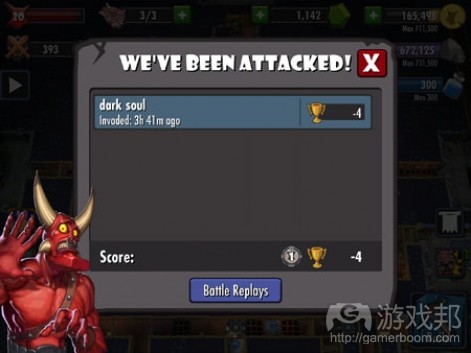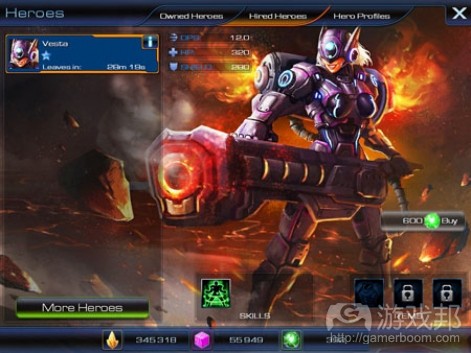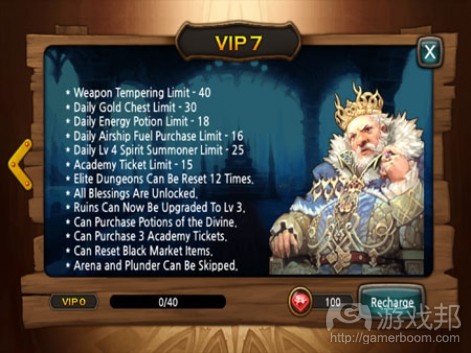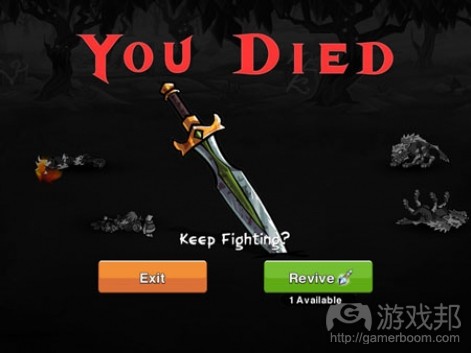18个最佳免费游戏盈利技巧
作者:Jon Jordan
距离我最初的Monetizer谈话已经过去了12个月。
为了参加在英国举办的Brighton 2013大会中的Evolve day of the Develop,我需要制作幻灯片,而当我在4个小时的火车车程中制作出自己的幻灯片时,我以为自己肯定会是胜利者。
尽管在前一天晚上当我把谈话的练习版本递交给一名同事时,我的决心开始出现动摇。之后,在谈话进行到一半时,我意识到在场的观众没有一个人知道我在说些甚么;甚至第一位提问观众的问题是:“所以这到底意味着什么?”
尽管出现了类似Stravinsky的《The Rites of Spring》的反应,但我依然坚持着。
结果便是出现了关于35款游戏的分析,更别提一些关于分析和比较免费手机游戏的开放源参数的创造和破坏了。
有趣的是,我最初的Monetizer参数(游戏邦注:考虑到IAP经济的定价结构以及游戏中最初10分钟的体验)未能延续。
但其中的IAP定价结构这一部分却发展成一系列参数,甚至被我用于着眼开发者如何尝试着零售他们的IAP,还有一些更加抽象的衡量标准,如IAP的平均价格以及IAP定价的数字和延伸。
我所收集的其它数据点(超过200款游戏)包含贴现货币比例,单位货币转换范围,受欢迎和成功比例以及关于IAP经济中各种百分比的分析。
我们也是如此走到了今天的谈话主题。
延续着我在北京GMIC的谈话内容,即我将“你应该在游戏中使用的10大免费盈利技巧”压缩在10分钟时间内。
在赫尔辛基,我计划提供给你们100%额外的23个“你应该在游戏中使用的免费盈利技巧”—-在15分钟内。
我将其称为“你可以在15分钟的谈话时间内整合多少最佳免费盈利技巧?”
1.这不是关于报复
报复是一种非常强大的情感—-一次爆发。即可能在我的基地被摧毁第99次时我们也不会在乎。
如果你希望玩家能够在乎报复—-这是对于他们所拥有的某些东西(对他们来说是有价值的)被摧毁时的情感回应,你就需要赋予这些东西真正的价值。
如果我的基地被摧毁后我能够直接回到正常生活中,我便不会在乎这件事。但如果我需要花费30秒才能回到正常生活中,我就会在意了。我甚至会因为太过在意而卸载游戏。不过我也有可能因为太在意而去购买防护物。
如果你让敌人破坏我所宝贵的财产,我便会开始抓狂并不断追击他们,直至将其消灭。这便是一种非常强大且危险的情感。
2.永久死亡,涂鸦或疤痕?
遵循第1点,让游戏或某些人能够在我的游戏领域或基地永久改变某些事物是现在的免费手机游戏中很少使用的工具,因为休闲或中核用户不能忍受这点。
但永久性破坏并不需要是特别严重,重要,或邪恶的情况。如涂鸦或种植树木?或者是疤痕都可以。
3.军队不应该是一次性的
从《部落战争》到《海岛奇兵》的最大改变是什么?存在许多改变,但其中一大改变便是你需要确保军队在战争中能够始终存活着。这很棒,因为你不需要再重新组建军队,但是出于某些原因,Supercell并未落实这一理念,让你能够贯穿游戏去升级你那幸存下的军队。
这不仅能够让你的幸存军队在游戏中变得更有价值,同时你对他们的情感依附性也会变得更强,在提供像复兴或定制化等选择中,这将更是更有价值的吸引力。
4.我们并不需要另外的英雄
关于第3点的逻辑结论便是英雄角色,这是在过去12个月的大势。你只要在任何应用商店中搜索“英雄”便能够得到答案。
但为了成为一名正派英雄,角色应该是与众不同,经过特别定制的(至少从视觉上看是这样的),我必须经历能够加深对于角色的情感投入和喜欢的体验中。
问题:如果你的游戏拥有英雄角色,我是否能够购买他们的3D模型?如果不可以的话,你的英雄角色可能就还不够英雄。
5.宗族,部落和联盟都是垃圾
对于像《部落战争》,《战争游戏》或《亚瑟王国》这样的游戏来说,最有价值的玩家便是部落中的一部分。
但对于大部分玩家来说,这样的组织却是纯粹的垃圾。他们完全就是一群幼稚的人,总是会因为一些再小不过的问题将我们踢出去。
但情况并不是都这样。社交是一种强大的机制,特别是在作用于共享体验时。可以是与现实世界中的朋友分享坐标,体育团队和喜欢的颜色等等。
重要的是让玩家进入一个游戏群组将提高留存率,所以为何不自动将所有人都分配到一个部落中。或者鼓励玩家加入一个部落或任何部落。让他们获得更棒的体验。
Kurt Vonnegut拥有一个很棒的理念去完善社交凝聚力。任何人在一出生便会被赋予属于自己的色彩,但是随着时间的发展人们可能会说:“是的,我认为他有点偏红色”,或者“她是经典的黄色”,亦或是“你也是紫色的,很高兴认识你。”人们的大脑会创造一些并不存在的模式。所以你也可以将其带到游戏中。
这里存在另一个想法。为什么我们只能待在一个部落中呢?如果设置多个不同的部落有什么问题吗?
6.带有利益的朋友
当你决定组建你的社交游戏结构时,确保让玩家能够做个慷慨的人。
送礼物是非常让人感动且有价值的行动,所以为何不让玩家能够频繁赠送一些较低级别的道具呢?显然存在让玩家赠送大量硬货币的欺骗问题,但是还有许多是玩家能够赠送的东西—-特别是考虑到免费游戏中二次货币的崛起。
7.让他们使用你的游戏的社交语言
许多人并不喜欢它们,但是我们却发现这种情况在针对游戏的朋友推荐码中获得发展。
这可能是源于像Facebook这样的社交网站。像LINE,Kakao等等平台变得越来越饱和,所以需要出现更多具有针对性的渠道。当然,为了让人们能够分享这一抽象的数字和字母,你就需要想办法激励他们。
但是当你让玩家使用它们时,你便知道他们是忠实于这些语言的。你甚至可以使用朋友推荐码去创造全新且更棒的部落系统(详见第5点)。
8.你是非常重要的
在亚洲,VIP身份不如在西方游戏中流行,但听到自己很重要的确是满足自尊心的重要途径。
你应该告诉任何在你的游戏花钱的人他们就是VIP,提供给他们好处,告诉他们如何变得更重要并获得更多好处。这并不会影响或破坏游戏状态。这可能是纯粹的外部表现。任何人都喜欢金光闪闪的铠甲,特别是只有VIP才拥有的铠甲。
9.订阅
虽然应用商店不一定会允许,并且面临着费用结构的问题,但是订阅真的是一个重要的现实世界零售选择。
也许游戏开发者可以考虑设置付费的订阅服务(使用硬货币或软货币)。如果与持续VIP服务相结合的话这会特别有效—-例如现在签约12个月的VIP订阅便只需要支付6个月的费用。
当然了,现在运行虚拟订阅(预先支付6个月的费用)是可行的。
10.Third Builder或Fourth Squad插槽
根据发展趋势,现在建造者已经过时了。《部落战争》带有建造者。玩家需要花费4.99美元才能打开Third Builder。这是我创造的第一个IAP,我之所以喜欢它是因为它是永久开启的,能够提升50%的建造效率。
这与基于群组的RGP情况类似,即你可以打开额外的插槽。处理这一点的一种灵活方式的有效例子便是Juicebox的《HonorBound》,它提供了一条前进之路或者硬货币之路。
相比之下,像《Boom Beach》和Kabam的《Dark District》等游戏使用了单一的建造系统,即你不得不使用硬货币去加速。这种做法比较没有触觉性,并且是迫使玩家花钱的趋势的一部分。
但是关于免费手机游戏的第一个规则便是不能迫使你的玩家花钱。
11.激励我
不能迫使你的玩家花钱。而是应该激励他们。
经过像《Candy Crush Saga》等游戏的证明,存在一股强大的冲劲让我们不能错失已经沉浸于其中的情况。这让人感觉就是一种浪费。
但是我们可以做得更好。许多游戏使用Boost,也就是一次性消费品去提升玩家在游戏中的地位,特别是在基于关卡的游戏中。
Boost应该获得广泛的使用。与软货币和硬货币系统联系在一起的Boost应该用于在有限时间内提供超级强大的能量。我们的玩家乐意在Boost上花费货币,因为这能够帮助他们获胜,而每个人都希望自己能够获胜。
实际上,开发者采用了预先boost。但是这可能会比较难出手,除非你可以清楚地呈现出预先购买这些boost的好处。
12.随着天数增加
我喜欢每日的奖励,特别是当我看到存在续集并且是在周末或月末时,我将能够从中获得一些很棒的内容。
但也许我可能会错过一天。所以可否让我能够记录下我所错过的每一天。因为我真的很想获得奖励。
13.PVP的威力(或者是否应该作为PVP+E?)
玩家对抗玩家活动对于某些玩家(喜欢支配权)来说是非常强大的推动力量。但并不是所有玩家都喜欢支配权,所以我们才会在《Boom Beach》和《Royal Revolt 2》等游戏中看到PVP与PVE的结合,在这些游戏中你可以只为了获得资源而供给其他玩家,并且你根本不在乎支配和报复元素。
我们需要记得,改变PVP的话我们便能够获得送礼功能。每个人都喜欢
送礼(详见第6点)。
14.相互作用
相互作用(考虑到影响)可能是任何免费游戏设计师应该理解的最重要的理念。
从根本上来看,它意味着当人们提供给我们少量东西(游戏邦注:如赞许,产品样本,甚至是免费的短期出租),我们便会对他们及其产品带有强烈的认同感。
对于免费游戏来说,它们可以通过提供给玩家帮助他们实现目标的游戏内部道具和货币而做到这点。
当然了,这里所存在的技巧便是提供同样能够鼓励玩家在游戏中消费的货币,不管是提升他们的游戏进程还是进一步鼓励他们重视的游戏内部货币,甚至是花真钱去购买这些货币。
在很多情况下,大多数玩家似乎都不够慷慨,特别是在提到硬货币礼物时;而Supercell却是个慷慨的卖家。
那些担心如何平衡游戏竞技的开发者们应该考虑在短时间内借给玩家强大的游戏内部道具。这将创造互惠感,同时也能够在出借期限结束时提供强劲的增效机会。
15.随机性
随机性是一股强大的心理力量,特别是在与强大的奖励维系在一起时。
对此最显著的例子便是博彩产业,即依赖于卡片组的52个可能性或轮盘赌的37或38个插槽等驱动力。
关于手机游戏,最佳范例便是带有Gacha随机系统(特别是用于纸牌收集游戏中)的日本开发者。不过它们也伴随着政府的约束。
你无需采取如此强硬手段。与奖励维系在一起的随机性能够通过使用老虎机机制或其它类似机制而整合到许多游戏中。你总是需要仔细思考是否允许玩家去使用硬货币。
16.复苏
通过定义,任何优秀的游戏都将在次优最终状态下,也就是游戏结束时吸引玩家的注意。然而,这是免费游戏的结构,即使用奖励加载任何游戏内部进程,这时候询问玩家是否想要继续游戏是完全合理的。
在这种情况下可行的技巧便是提供一个有意义的交易。很少有人想要在25%的健康状况下复苏。复苏是一个强大的行动。
17.通胀压力
通货膨胀是一种知名且让人恐惧的现实世界的经济压力。随着时间的发展,价格也不断提升,从而在工资方面所造成的压力也会不断增加。
这种情况将影响着免费游戏,尽管它也长期影响着MMOG,它们必须引进更高价的稀有道具去推动用户花钱。
设计师也可以将通货膨胀带进手机游戏中,就像flaregames的《皇家起义2》,即每次当你执行一些重复行动,如销毁间隙,游戏便会要求更高的支付。
18.现在或之后的时间
从本质来看,游戏是抽象且虚拟的,所以你采取任何将其变得更直接且更现实的方法都是重要的。
显然,我们都知道游戏是作为一种服务,所以你需要运行时间事件的消息也不是什么让人惊讶的事了。
你需要留意如何运行这些事件,就像你让玩家为了虚拟体验停止现实世界的活动。
基于这一层意义,时间需要是预期且让人兴奋的,而不是不符合常规或像与牙科医生的约定那样。
(本文为游戏邦/gamerboom.com编译,拒绝任何不保留版权的转功,如需转载请联系:游戏邦)
18 top F2P monetisation tips and tricks to supercharge your business
By Jon Jordan
It’s been almost 12 months since I stunned the world into boredom and general disinterest with my original Monetizer talk.
Delivered at the Evolve day of the Develop in Brighton 2013 conference in the UK, I thought I was onto a winner when I was drawing up my slides on the 4 hour train journey down.
Although my resolve started to waver when delivering a practise version of the talk to a colleague the night before. Then, halfway through the talk, I realised no one in the audience had a clue what I was on about; something underlined by the first audience question: “So what did that mean?”
I’ve been throwing darts at a photo of Jason Avent’s face every day since.
Onward Christian soldiers…
But, despite a reaction akind [sic] to Stravinsky’s The Rites of Spring, I’ve persevered.
That’s resulted in the analysis of 35 games – you can check out the videos here – not to mention the creation and destruction of several open source metrics for analysing and comparing F2P mobile games.
Interestingly, my original Monetizer metric – which considered the pricing structure of IAP economies and the initial 10 minute experience in a game – hasn’t lasted.
But part of it – the IAP pricing structure – has matured into a series of metrics that I use to look at how developers try to retail their IAPs, as well as more abstract measures such as the Average Price of an IAP, and the number and spread of IAP prices.
Other data points I’ve collected – now on over 200 games – include the Discounted Currency ratio, the Unit Currency Conversion range, not to mention Popularity and Success ratios and analysis of percentage fill IAP economies.
All very Professor Jordan, I’m sure you’ll agree, but perhaps not very useful for your day-to-day existence.
Which brings us to today’s topic of conversation.
Following on from a talk given at GMIC Beijing, where I squashed ’10 F2P Monetisation Techniques You Should Use To Supercharge Your Games’ into 10 minutes…
…in Helsinki I’m planning to give you over 100 percent extra with 23 ‘F2P Monetisation Techniques You Should Use To Supercharge Your Games’ – all within 15 minutes.
I’m calling it ‘How many top F2P monetisation tricks can you fit into a 15 minute talk?’
1. It’s not about revenge?
Revenge is a powerful emotion – once. The 99th time our base is trashed, we don’t care.
If you want a player to care about revenge – which is an emotional response to something that they own (which has value to them) being destroyed – then you have to make that thing actually have value.
If my trashed base immediately pop back into life, I don’t care that it was trashed. If, however, it take 30 seconds to pop back into life, I do care. I might care so much I uninstall your game. I might care so much I buy a shield.
And if you let the enemy desecrate my prized possessions, I’m going to get really mad, and track them down and kill them. That’s a really powerful – and dangerous – emotion.
2. Permadeath, graffiti or scars?
Following on from point #1, allowing the game or someone else to permanent change things in my game state or base is a rarely used tool in current F2P mobile gaming because a casual or midcore audience can’t stomach it.
But permanent damage doesn’t necessarily have to be serious, significant or even nefarious. What about graffiti? Or planting trees? Or scars? Chicks dig scars.
3. Troops should not be disposable
What’s the big change from Clash of Clans to Boom Beach? There are plenty but one is that you keep the troops that survive the battle. This is nice because you don’t have to rebuild, but for some reason Supercell hasn’t taken this concept to its logical end point and enabled you to level up individual surviving troops throughout the game.
Not only does that make surviving troops more valuable in-game, you also have more emotional attachment to them, which is a valuable hook in terms of offering options such as revives or customisation.
4. We don’t need another hero
The logical conclusion of point #3 is the hero character, which has been a big trend over the past 12 months. Just search for the term ‘Hero’ in any app store.
But to be a proper hero, the character can’t be generic, must be highly customisable – at least visually – and I must go through experiences that deepen my involvement and love for this character.
Question: if your game has hero characters, can I buy a 3D model of them? If not, your hero characters are likely not heroic enough.
5. Clans are crap. Tribes are toss, and Alliances are awful
For games such as Clans of Clans, Game of War or Kingdoms of Camelot, the most engaged and valuable players are part of a clan.
But for the vast majority of players, such organisations are pure crap. They’re full of teenage idiots, who will kick us out for the smallest mistake, and that’s even if we get around to randomly choosing a group in the first place.
But it doesn’t have to be like that. Social engagement is a massively powerful mechanic, especially if it’s leveraged on shared experiences. That could be anything from real world friends to a shared location, sport team or favourite colour.
The bottomline is getting players into a game group will improve retention so why not automatically drop everyone in a clan. Or incentivise players massively to join a clan, any clan. Make the experience nice for them.
Kurt Vonnegut had a brilliant idea to improve social cohesion in America. At birth, everyone would randomly be given a personal colour – one of a half a dozen. His point was that despite being totally random, over time people would say; ‘Yes, I though he was a bit Red’, or ‘She’s a classic Yellow’, or ‘Great, you’re a Purple too. Nice to meet you’. The human brain creates patterns where there are none. Do it in your game.
And here’s another thought. Why should we only be in one clan? What’s wrong with multiple clans?
6. Friends with benefits
However you decide to structure your social game structures, let players be generous.
Gifting is a very emotional and valuable action so why not let players do more than gift low grade items? Obviously there are fraud issue with letting people gift large amounts of hard currency but there are plenty of other things people can gift – particularly given the rise of secondary currencies in F2P games.
7. Get them talking your game’s social language
Lots of people don’t like them but we’re seeing a rise in game-specific friend referral codes.
Likely this is because social networks like Facebook. LINE, Kakao etc are becoming saturated so new, more specific channels, are opening up. Of course, to get people sharing this abstract strings of numbers and letters you need to incentivise the hell out of their use.
But when do you get players using them, you know they’re committed. And you could even use friend referral codes to generate a new, better clan system (see point #5).
8. You are VERY important
Big in Asia, VIP status hasn’t been particular popular in western games, but being told you’re important is a massively powerful enhancement to our self-esteem.
Anyone who spends money in your game should be told they are a VIP, given benefits, and told how they can be more important, and gain more benefits. And this doesn’t have to impact or unbalance game state. It could be purely cosmetic. Everyone like shiny armour, especially if it’s only for VIPs.
9. Subscriptions
Difficult in terms of whether app store will allow, and also problematic in terms of the fee structure, nevertheless subscriptions are an important realworld retailing option.
Perhaps game developers could think about setting up subscription services that are paid using hard or soft currency. This would work particularly well when combined with ongoing VIP services – i.e. sign up now for a 12 month VIP subscription and only pay for 6 months.
Of course, running virtual subscription – pay one upfront fee now for 6 months for all these benefits – is something that can be accomplished now.
10. The Third Builder or the Fourth Squad slot
The trend suggests builders are now old fashioned. Clash of Clans had builders. The Third Builder costs $4.99 to unlock. It was the first IAP I made and I loved it because it was a permanent unlock that increased my building efficiency by 50 percent.
It’s a similar situation with squad-based RGPs, where you can open up additional slots. A good example of a flexible way to approach this is Juicebox’s HonorBound, which offers a progression path or a hard currency path.
In contrast, games such as Boom Beach and Kabam’s Dark District use a single build system that you have to speed up with hard currency. That’s much less tactile and is part of a tendency to Nickel & Dime’ our players.
But the first rule of F2P mobile games is don’t Nickel & Dime your players.
11. Boost me, baby
Don’t Nickle & Dime your players. Supercharge them.
As proven by games such as Candy Crush Saga, there is a strong impulse not to lose a situation we are already engaged in. That feels like a waste.
But we can do better. A lot of games use Boosts – that is one-off consumables to improve your in-game status, typically within level-based games.
Boosts can – and should – be much more widely used, however. Linked into soft and hard currency systems, Boosts should be use to provide superhero powers for a limited time. Spending currency on boosts should be something our players love to do, because they help them win, and everyone loves to win.
In particular, developers are adopting pre-level boosts. These can be difficult to sell, however, unless the benefits you can from pre-buy these boosts is made obvious.
12. More, every single day
I love daily rewards, particularly when I can see there’s a sequence and at the end of the week, or month, I’m going to get something great.
But maybe I’ll miss a day. So how about letting me a log-in for any days I miss. Because I really want that sweet prize?
13. The power of PVP, (or should that be PVP+E?)
Player versus player activity is a very powerful driver for some players – players who enjoy dominance. But not all players enjoy dominance, that’s why we’re seeing PVP merging with PVE in games such as Boom Beach and Royal Revolt 2, where you attack other players purely for resources but the dominance and revenge element (see point #1) is pretty much ignored.
And remember, reversing PVP and we get gifting. And everyone love gifting (see point #6).
14. Reciprocity
Reciprocity – giving for influence – is probably the most important concept for any free-to-play game designer to understand.
Basically it means when people give us a small amount of something – praise, a product sample, even a free short-term rent – we have strong positive feelings toward them and their products.
In terms of F2P games, this is most simply accomplished by giving players in-game items and currency for achieving goals, such as completing tutorials.
Of course, the trick is giving them in-game currency also encourages them to spend that within the game, both increasing their progression in the game and further encouraging them to value in-game currency, and perhaps even spend real money to buy some of their own.
In many cases, however, most developers seem limited in their generosity, particularly when it comes to hard currency gifts; Supercell is a good example of a generous vendor.
Still, developers worried about unbalancing their game economy should consider lending players powerful in-game items for a short period of time. This generate reciprocal feelings while also providing a strong upsell path once the lend period is over.
15. Spin the Wheel
Randomness is a powerful psychology force, particularly when it’s associated with strong rewards.
The most obvious example of this is the gambling industry, which relies on such drives in terms of the 52 possibilities of the card deck, or the 37 or 38 slots of the roulette wheel.
In terms of mobile games, the best exponents have been Japanese developers with their Gacha random system, typically used in card collection games. So successful, it’s had government restrictions imposed on it.
You don’t have to play it so hardball, however. A bit of randomness linked to rewards can be simply integrated into many games using a spin the wheel or one-arm bandit mechanic, or something similar that fits your game’s context. You’ll want to think carefully about whether to allow players to use hard currency, though.
16. Resurrection
By definition any decent game is going to engage the player in sub-optimum end conditions, aha Game Over. However, such is the structure of F2P games, which typically load any in-game progression with rewards, it’s perfectly reasonable to ask the player whether they want to continue to play, at some sort of resource.
The trick in these situations is, however, to offer a meaningful deal. Few people will want to resurrect at 25 percent health. Resurrection is a powerful action. It should be all or nothing.
17. Inflationary pressures
Inflation is a well-known and much feared real-world economic pressure. Over time, prices rise, which then puts upward pressure on wages.
This sort of thing is yet to impact mobile F2P games, although it does trouble longterm MMOGs, which have to introduce high priced rare items to soak up users’ increasing cash piles.
Yet designers can cleverly introduce inflation into mobile games too, as demonstrated by flaregames’ Royal Revolt 2, which charges more each time you perform some repeated events, such as ruin clearance.
18. The time is now… or later
By their very nature, games are abstract and virtual, so anything you can do to make them more immediate and real is important.
Obviously, we all now know about games-as-a-service, so the news that you need to run timed events should not be a surprise.
You do need to be careful about how you run these events however as you are asking your players to stop their real-world activity for a virtual experience.
In that sense, timing need to be both anticipatory and exciting, not presented in an illogical manner or like a dentist’s appointment – something Glu Mobile manages to combine in this prompt from Odyssey.(source:pocketgamer)











































 闽公网安备35020302001549号
闽公网安备35020302001549号